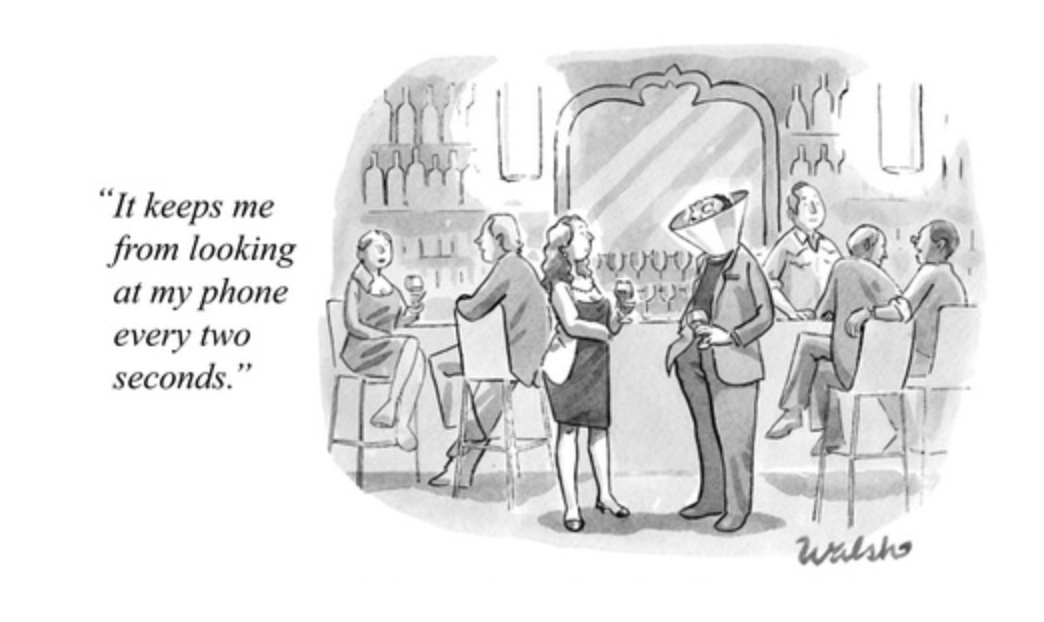23% of your Life spent on the Phone.
In this day and age where most us spend over 25 hours a week or 23% of their waking life on their phones, we have to ask ourselves what impact this behavior has on our minds, emotions, and productivity.

The Insatiable Mind
In this day and age where most us spend over 25 hours a week or 23% of their waking life [1] on their phones, we have to ask ourselves what impact this behavior has on our minds, emotions, and productivity.
Can we overload and overfill our minds with TMI (Too Much Information)? Do we all suffer from some form of 'Information Overload'? What are the consequences?
After some research I found this quote;
Information overload occurs when the amount of input to a system exceeds its processing capacity. Decision makers have fairly limited cognitive processing capacity. Consequently, when information overload happens, it is likely that a reduction in decision quality will occur.
'Information Overload' and its adverse side effects was first discovered by German sociologist Georg Simmel (1858–1918), who hypothesized that...
...the overload of sensations in the modern urban world caused city dwellers to become jaded and interfered with their ability to react to new situations.
Here are some facts:
74 gigabytes - 9 DVDs worth of information is sent to the average American on any given day [2]. Data received at work not included.
Most people connect to more than 30 different media sources daily, ranging from traditional media outlets on TV, Radio, Telephone to newer digital sources consumed on tablets, smartphones, or gaming devices.
28% of our workday is spent managing emails. That's about 2 hours and 14 minutes each day. Most professionals receive over 50 work-related emails per day. Managers and executives receive 200-300 emails. In a recent study, only 6 percent of professionals responded that they could process more than 50 emails per day. That does not include and account for direct messages sent via newer collaboration tools like Slack or Asana.
When at work we are interrupted (by email, instant messages, phone call, text message, colleague, etc.) every 8 minutes. That accounts for over seven interruptions per hour. A study by Basex found that the calculated cost of interruptions in lost working hours to US businesses is $588 billion a year.
It feels like that our minds have become insatiable. There are definite limits to how much food you can eat, how much alcohol you can drink, and how many miles you can run. But for some reason, it's tough to gauge these limits when it comes to information consumption naturally.
There's a false assumption out there. We think that doing multiple things at the same time at lighting speed makes us more productive. The opposite is true. Chances are very high that 'Information Overload' is hurting your productivity and affecting your well-being. With ever-increasing distractions from our 'Always Connected' lifestyle, the mental effort required to process all this information has gone through the roof.
This addictive usage behavior has penetrated our society so deep and so far that sometimes I think it's too late to bring awareness and solutions to this. At the same time, people from the highest ranks of Facebook such as Sean Parker are speaking out how Facebook was designed to be addictive.
It's even more concerning when you read that the average American family only spends 3.5 minutes per week in meaningful conversations. This was found by the author Thomas J Kersting during the research for his book 'Disconnected'.
Some people don't see this as a problem and ignore these facts, if you are not one of these people and want to explore your behavior a bit further, you can try to create more awareness by trying some of the things below;
1. Observe yourself and your phone usage behavior.
How many times a day do you pick your phone. Do you pick it up anytime there's a moment of silence? I like the Moment App, this app tracks how many times a day you pick up your phone and how much time you spend on it. Awareness is the first step to change any behavior. Give it a try!
2. Try to go phone free for a short period.
Best done on the weekend. Try to go between 1-4 hours without your phone. Spend for example a Saturday morning, no matter what you do without your phone. Consciously turn your phone off and leave it in your drawer. Try to see this as an experiment and challenge. Jot down how you feel and what excuses you come up with to not doing it. Again, this exercise just helps to create awareness.
3. Don't check pick up your phone and check E-mail first thing in the morning.
If you're like most people, you probably pick up your phone and check E-Mail, Instagram, or the Bitcoin price within 30 minutes of getting up - if you can last that long ;-). And if you're like me, I'm sure you have a million reasons why your life depends on it. For one to two days this week try to hold off on picking up and checking your phone until 10 am. Notice the feelings and urges that come up. Most likely you will feel agitated, nervous, bored, restrained, but try to find a sense of freedom, relief, space, and relaxation.
These are the first steps you can use to 'Login to Yourself' and become aware of your behavior and emotions. Also check our blog post on how to do a digital detox for more information.
Also read: Digital Detox vs Digital Well-Being
Illustration by Liam Francis Walsh
